Samurai 武士
|
Title   • File Name • File Name   • Date • Date   • Position • Position   |
|

Matchlock gun demo at Azuchi Nobunaga Festival
|
|

Statue of castle founder and 1st lord, Yuki Hideyasu 結城秀康
|
|

Shimizu Bank's relief of Kazutoyo and Chiyo
|
|

Demonstration of matchlock guns, Azuchi Nobunaga Festival.Even these people had to obtain police permission to bear and fire these feudal-era guns.
|
|

Yamauchi Kazutoyo
|
|

Statue of Chiba-no-suke Tsuneshige built in Dec. 2001 to commemorate Chiba city's 80th anniversary. 千葉介常重Lord Chiba-no-suke Tsuneshige was the founder of Chiba Castle in 1126.
|
|

Tokugawa Ieyasu at his base camp
|
|

Exhibits inside the castle, a folk and history museum for the Chiba clan and Chiba city.
|
|

Statue of Ishida Mitsunari
|
|

Tokugawa Ieyasu inspecting the head of his enemies at his base camp
|
|

Minamoto no Yoritomo (Hatakeyama Shigetada). His prayers for victory were answered. 源 頼朝 隅田川陣営 (畠山重忠)
|
|

The most important historical persons in Azuchi's feudal history were represented.
|
|

Sekigahara Warland
|
|

Shibata Katsuie
|
|

Niwa Nagahide 丹羽長秀
|
|
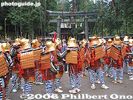
The warriors are the procession's main attraction.Waiting near Futarasan Shrine's torii.
|
|

Oda Nobunaga 織田信長
|
|

Ishida Mitsunari 石田三成
|
|
|

Toyotomi Hideyoshi 豊臣秀吉
|
|

Ii Naomasa 井伊 直政
|
|

Hello horse! He was just starting at me. Tokugawa Ieyasu
|
|

Tokugawa Ieyasu takes up residence in Edo. 徳川家康 江戸入府
|
|
|

Lord Ii Naomasa, a right-hand man of Tokugawa Ieyasu and major ally in the Battle of Sekigahara in 1600. Based in Hikone, Shiga Prefecture. 井伊直政 徳川家康 江戸入府
|
|

Year 1603: Tokugawa Ieyasu becomes Shogun. He designates Asakusa Temple as a place of worship, and he worships there himself in 1616. Behind him is his son Tokugawa Hidetada who became the second Tokugawa shogun. 徳川家康 江戸入府
|
|

Warrior armor displayed on second floor of Himeji Castle tower
|
|
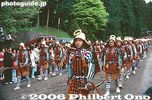
Warriors coming down the Omotesando. 武者行列
|
|

Face of a samurai.
|
|
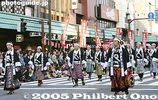
On Dec. 14, 1702, Asano's 47 masterless retainers avenged their master's death by attacking and beheading Kira at his residence in Ryogoku.義士の討ち入り
|
|
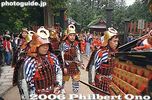
Warriors leaving the Otabisho.
|
|
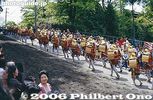
Warriors walk back up the slope in front of the Otabisho.
|
|
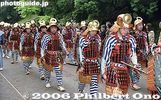
Warriors on Omotesando
|
|

Shinsengumi disbanded when the shogunate collapsed and Emperor Meiji became the head of state. The Shinsegumi wore a distinct costume with a light blue haori. 新撰組
|
|

Shinsengumi新撰組
|
|
|

Yoroi Toshikoshi Shuko festival, Ashikaga, Tochigi.
|
|

Yoroi Toshikoshi Shuko festival, Ashikaga, Tochigi.
|
|
|

Little Edo Hikone Castle Festival Parade
|
|

Ii clan warriors
|
|

Ii Naomasa (井伊直政) (1561-1602 ) was the first lord of Hikone from 1600. He was a general under Tokugawa Ieyasu whom he helped to win the Battle of Sekigahara in 1600. He was rewarded with the fief of Omi (now Shiga) and built Hikone Castle.
|
|
|

Hiko-nyan is Hikone's official mascot. A white cat wearing a samurai helmet modeled after Ii Naomasa.
|
|
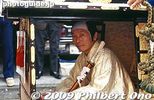
The daimyo feudal lord in Hakone Daimyo Gyoretsu Procession.
|
|

Statue of Ii Naomasa in front of Hikone Station
|
|

Each float has a decoration on the roof depicting a popular topic during the past year. This is Yamauchi Kazutoyo and wife Chiyo from the NHK Taiga Drama called "Komyo ga Tsuji.""Komyo ga Tsuji" is about a up and coming samurai named Yamauchi Kazutoyo and his wife Chiyo who was from Shiga. The story's main setting is Shiga, and the year-long TV series was broadcast during 2006.
|
|

Statue of Lord Takatora Todo, who became the 11th lord of the castle in 1608. He is revered for revamping the castle and developing the castle town of Tsu. He was originally from Inugami, Shiga Pref. This statue was built in 1998.
|
|

Oda NobunagaIn the Azuchi Castle Museum (Azuchi Jokaku Shiryokan)
安土城郭資料館
|
|

Statue of Ii Naosuke, lord of Hikone Castle in Shiga Prefecture in Kamonyama Park, Yokohama. In 1914, the Ii family donated Kamonyama Park to the city of Yokohama.
|
|
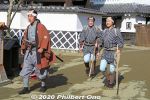
Oh-oh, the Edo police are on the prowl, looking for criminals. At Edo Wonderland in Nikko, Tochigi.
|
|
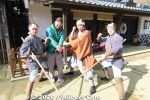
Under arrest by the Edo police. Rope handcuffs.
|
|

On the day I went (May 9) during Golden Week, they held the Tempyo Gyoretsu Procession featuring 1,300 people in Tempyo (Tenpyo) Period (729-749) costumes.
|
|

The Heijo Palace guard (Ejitai) holds the Gate-closing ceremony at the end of the day at Suzaku Gate at 5:10 pm. 衛士隊
|
|

The Heijo Palace guard (Ejitai) holds the Gate-closing ceremony at the end of the day at Suzaku Gate.
|
|

Statue of Lord Toda Ujikane who was the Ogaki Castle lord in 1635.
|
|
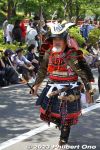
Very elaborate handmade samurai armor and costume. Odawara, Kanagawa.
|
|
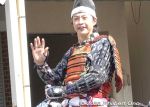
The first Odawara Hojo lord, Hōjō Sōun played by actor Goda Masashi. 初代北条早雲 (合田 雅)
|
|
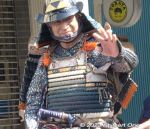
The second Odawara Hojo lord, Hojo Ujitsuna. 二代北条氏綱隊
|
|
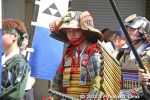
Hōjō Choko (Gen'an), second and youngest son of Hōjō Sōun. 北条長綱隊 国際医療福祉大学
|
|
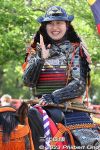
The third Odawara Castle lord, Hojo Ujiyasu played by a woman. Trotting past Odawara Castle. 三代北条氏康隊
|
|
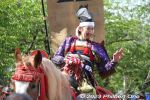
The fourth Odawara Castle lord, Hojo Ujimasa played by well-known actor Takashima Masanobu. 四代氏政 (高嶋政伸)
|
|
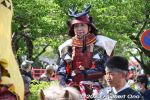
Hachioji Castle lord, Hojo Ujiteru played by a woman. 八王子城主 北条氏照隊
|
|
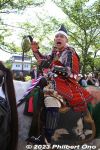
The fifth Odawara Castle Hojo lord, Hojo Ujinao played by Yanagisawa Shingo who is another Odawara Hometown Ambassador. 五代氏直 (柳沢慎吾)
|
|

The Gishisai on Dec. 14 marks the day when the 47 loyal retainers attacked and beheaded Kira to avenge their master (Lord Asano) in 1702. They then marched to Sengakuji to present the head to their master's grave. This is reenacted annually.
|
|
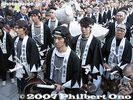
Gishisai: Kira's head strung on a spear is brought to Sengakuji temple.
|
|
|

Leader of the 47 ronin, Oishi Kuranosuke goes in front of the Hondo hall and reported their successful capture of Kira.
|
|

After reporting to their lord, the group leaves the temple.
|
|
|

Tokugawa Ieyasu at the Battle of Sekigahara Festival, 2008
|
|

Tokugawa Ieyasu retainer at the Battle of Sekigahara Festival, 2008
|
|

Fierce samurai
|
|

A woman samurai
|
|

Plastic samurai armor
|
|
|

Takatora Summit in Kora, Shiga
|
|
|

Cute warrior
|
|

Ninja show
|
|

Statue of Lord Todo Takatora (in Kora, Shiga Prefecture) who became the 11th lord of Tsu Castle (Mie Pref.) in 1608. Behind it is the Takatora Waterfall.
|
|
|
|
|
|
|